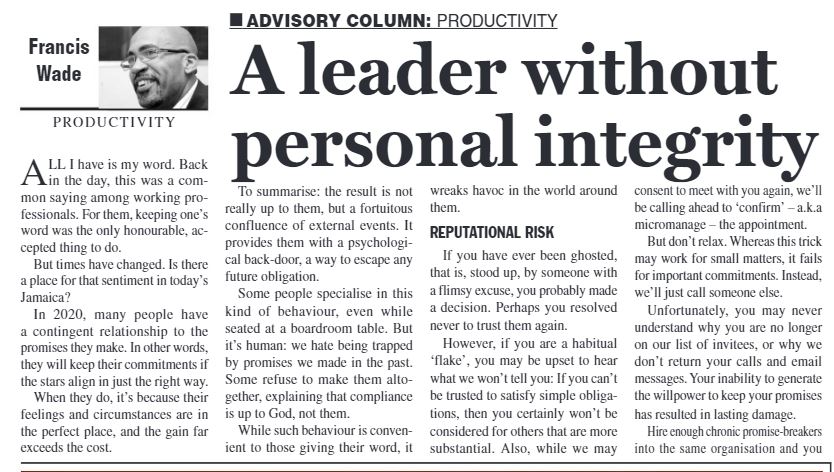“All I have is my word.” Back in the day, this was a common saying among working professionals. For them, keeping one’s word was the only honorable, accepted thing to do. But times have changed: Is there a place for that sentiment in today’s Jamaica?
In 2020, many people have a contingent relationship to the promises they make. In other words, they will keep their commitments if the stars align in just the right way.
When they do, it’s because their feelings and circumstances are in the perfect place, and the gain far exceeds the cost. To summarize: the result is not really up to them, but a fortuitous confluence of external events. It provides them with a psychological back-door: a way to escape any future obligation.
Some people specialize in this kind of behaviour, even while seated at a boardroom table. But it’s human: we hate being trapped by promises we made in the past. Some refuse to make them altogether, explaining that compliance is up to God, not them.
While such behaviour is convenient to those giving their word, it wreaks havoc in the world around them. Here are two ways.
1. Reputational Risk
If you have ever been ghosted (i.e. stood up) by someone with a flimsy excuse, you probably made a decision. Perhaps you resolved never to trust him/her again.
However, if you are a habitual “flake”, you may be upset to hear what we won’t tell you: “If you can’t be trusted to satisfy simple obligations, then you certainly won’t be considered for others which are more substantial.” Also, while we may consent to meet with you again, we’ll be calling ahead to “confirm” (aka micromanage) the appointment.
But don’t relax. Whereas this trick may work for small matters, it fails for important commitments. Instead, we’ll just call someone else.
Unfortunately, you may never understand why you are no longer on our list of invitees, or why we don’t return your calls and email messages. Your inability to generate the willpower to keep your promises has resulted in lasting damage.
2. Organizational Weakness
Hire enough chronic promise-breakers into the same organization and you have the perfect recipe for bankruptcy.
Case in Point: A founder, known for honouring his word, dies and leaves the company to an unreliable sibling. The inheritor never understands the invisible glue of integrity that enabled the company to thrive. Consequently, promises are broken on a whim so customers, employees and other stakeholders start a steady exodus to better alternatives. It’s a lack of integrity writ large: a violation of the brand promise, employee compact, or shareholder trust. These are all unwritten expectations no company can break for long.
Arguably, the rise and fall of the quality of Digicel’s mobile service is such an example. When it entered the market in 2001, it delivered a striking, powerful salvation from C&W’s monopoly. But recently, the government reported a meeting with the company to complain, on behalf of consumers, about its poor service: a dramatic reversal for a favorite brand.
What can leaders of companies like Digicel do? They can undertake a return to workable standards on a personal, but public level.
In an era in which the President of the United States freely reverses his stated commitments to people, precedent and principles alike, the world is short of those who lead by example. It appears that the practitioners of “situational integrity” are “winning.”
This has not gone unnoticed in Jamaican society, however. Organizations like the NIA and CAFFE are pushing to return our country to a simpler standard: a time when people did what they said they would, just because they said they would…especially when it’s hardest to do so.
But the key is not to merely be wary of making promises. The deeper challenge is to relate to one’s word as if it were as important as oneself: a reflection of character.
Unfortunately, when life is working as it should, the challenge seems to fade in importance.
For example, several local politicians have apologised for disparaging remarks made on the campaign trail about an opposition Member of Parliament. In essence they said: “Those comments are not a reflection of who I am.”
The irony is that Digicel and other organizational leaders could see their recent shortcomings as an opportunity to return themselves to who they really are. Jamaica yearns for this kind of leadership: the kind that willingly reveals itself when mistakes are made, at the moments when it’s inconvenient, uncomfortable and unprofitable.
These opportunities demonstrate how to live old-fashioned principles in modern-day life and empower everyone of us to do the same.

